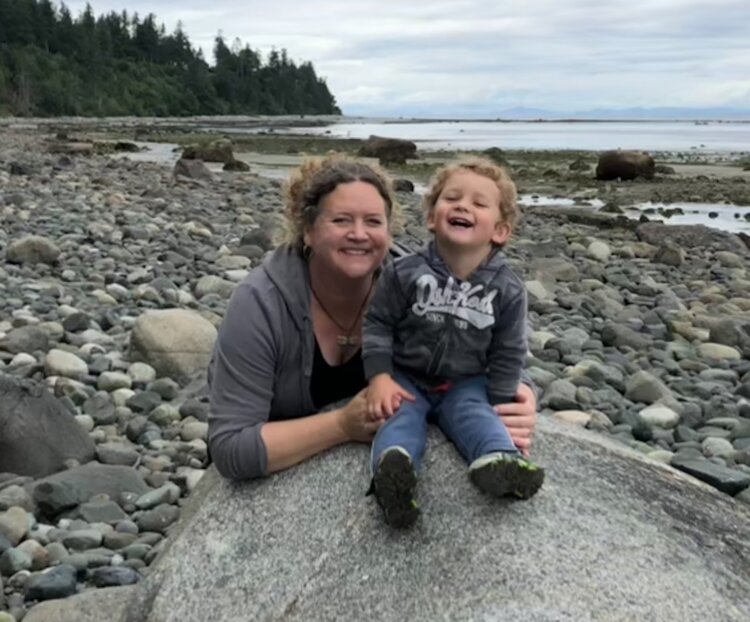
I’m consciously raising my son to be a strong person who supports and celebrates the strength and equality of all people. At 3 and a half, he’s already a thoughtful child with lots of questions about the world, which I welcome and encourage.
But gosh, I didn’t realize how many questions there would be! Sometimes his barrage is so fast and furious that, especially if I’m engaged in another task like driving, I can’t help but answer on autopilot. In these moments of less-than-ideal focus, I am shocked at how often I respond to his queries using gender-biased language.
Words like “mailman,” “fireman,” and “waitress” have mindlessly rolled off my tongue to describe people in our community. I usually catch and correct myself with the gender-neutral terms “mail carrier,” “firefighter,” and “server,” but my regular need to do this shows how deeply it’s ingrained in my subconscious.
I find this deeply unsettling.
Growing up as an English speaker in North America in the 1980s, gendered language was just… language. Although efforts to recognize and remedy gender bias existed, it wasn’t common practice. I remember when stay-at-home-moms started rumbling about being called “housewives” and began to substitute “domestic engineer,” much to the amusement of a lot of men. “Feminist” was often used pejoratively against any woman who questioned the status quo. I remember being followed home by a couple of neighborhood bullies one afternoon, and the insult they chose to hurl at me was one I’d heard many times in movies: “dumb broad!”
But, as cognitive scientists, such as Lera Boroditsky, have discovered, the everyday language we use is extremely powerful—and can even shape our thinking. When we grow up surrounded by gendered language, we are more likely to perceive gender binaries in our world, and this can subconsciously impact our views of both genders. For example, men are often seen as ones who act and women are the ones acted on. About a decade ago a male friend jokingly remarked that a club was crawling with “grizzlies” (older, more assertive versions of “cougars”). The idea of women, especially older women (“little old ladies,”) so brazenly asserting their sexual desire seemed so unnatural, and, I’m sorry to say, I laughed. A lot.
Knowing all of this, it feels essential that we be thoughtful about the words we choose—especially if we are parents or work with children. Looking back on my time as a classroom teacher, I cringe at how many times I carelessly addressed my class as, “You guys.”
When linguistic gender bias is allowed to slip by, our very language becomes an insidious tool of oppression, suggesting that women are excluded from certain professions like “policeman” and “businessman,” or that we are somehow less than a man in the same job, indicated by the pervasive use of diminutives like “waitress,” “actress,” “poetess,”or “governess.” Heck, we are sometimes even excluded from the population of the planet: “mankind.”
In 1999, UNESCO published their Guidelines on Gender-Neutral Language. Author Breda Paoli lists commonly gendered terms and offers suggestions for gender-neutral substitutions. There are many, but, in addition to the ones I’ve already mentioned, a few jumped out as being terms I’ve continued to flub. For example, I’ve complimented (facepalm) female artists for their “craftsmanship,” (better: “craft”) or used terms like “landlord” (better: “owner”), “ombudsman” (better: “mediator”), and “manmade” (better: “artificial”) without a second thought.
Common adjective associations can be just as sneaky, reinforcing gender stereotypes. I’ll remember to bite my tongue if I start to refer to one of my son’s assertive and confident female friends as “bossy.” And while I’m not in the habit of speaking negatively about people, I try to be aware of using words to unfavorably describe women that aren’t used the same way (or at all) with men. Words like “hormonal” (men are also affected by hormones), “high-maintenance,” “emotional,” and even ones that, at first, seem kind of funny, like “Bridezilla” or “Stage Mom.” Men can also get a little testy in the planning and lead-up to their weddings, or be over-involved in their children’s activities, but there are no special words for them.
And it’s not just words that diminish women that are a problem. Guardian columnist Arwa Mahdawi explores how new and increasingly common words used to describe problematic male behaviors (think “mansplaining” or “manspreading”) serve to reinforce the binary between men and women, linguistically setting the genders against each other when we need to be coming together.
We don’t need to be slaves to our cultural and linguistic upbringing. As Boroditzky postulates at the end of her TED talk, by thinking critically about language we can harness its power: “What thoughts do I wish to create?” Language can help shape our thoughts in order to create the kind of world we want to live in.
I don’t just want my son to be a feminist; I want him to be a humanist. I want him to see and acknowledge the value and natural equality of every person he meets, regardless of difference. I know it’s just one piece of the puzzle, but our words are powerful tools. Linguistic gender-bias, racism, classism, abelism etc… are problematic. Some people are currently up in arms about the “incivility” of some salty language in Congress, but perhaps, in order to foster a truly civil, equal society, we should be watching our mouths for words more harmful than some f-bombs.


Grok Nation Comment Policy
We welcome thoughtful, grokky comments—keep your negativity and spam to yourself. Please read our Comment Policy before commenting.